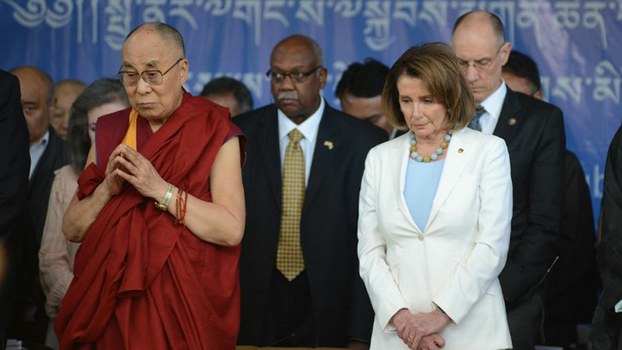A bill to strengthen U.S. policy in support of Tibet won strong approval Tuesday by the House of Representatives, a move a Tibetan representative called an “encouraging and empowering” measure for the Himalayan Buddhist region controlled by China for seven decades.
The Tibetan Policy and Support Act (TPSA) was passed by a vote of 392 to 22, and now requires a vote in the Senate, which is also reviewing a companion bill.
“It is a historic victory for Tibet, for justice and truth,” said Ngodup Tsering, the Dalai Lama’s representative in North America.
Co-sponsored by Democratic Rep. James McGovern and Republican Senator Marco Rubio, the TPSA when signed into law will require China to allow the opening of a U.S. consulate in Tibet’s regional capital Lhasa before any new Chinese consulate can open in the United States.
It will also address water security and climate change issues in Tibet and strengthen the still-unfilled State Department office of the Special Coordinator for Tibet.
Finally, it will establish a U.S. policy that the selection of Tibetan religious leaders, including future successors to exiled spiritual leader the Dalai Lama, is a decision to be made by Tibetans free from Chinese government interference.
“It should be clear that we support a positive and productive US-China relationship but it is essential that human rights of all the people of China are respected by their government,” McGovern said on the House floor on Tuesday.
Speaking before the vote took place, House Speaker Nancy Pelosi said “repression by the Chinese government in Tibet is a challenge to the conscience of the world.”
“This legislation also deploys America diplomatic ways to encourage genuine dialogue between Tibetan leaders and Beijing. It is unacceptable that the Chinese leaders still refuse to enter into a dialogue with Tibetan leaders,” she said.
Sanctions targeting Chinese officials attempting to name a new Dalai Lama will also be mandated under the bill.
The question of who will select a successor to the now 84-year-old Dalai Lama is a major point of friction between China, which insists on its right to choose the religious leader’s reincarnation, and Tibetans inside their homeland and around the world.
“The Chinese Communist Party wants to ensure Tibetan leaders are chosen according to their agenda, their political agenda, not according to Tibetan Buddhist religious practices,” Rep. Michael McCaul, lead Republican of the House Foreign Affairs Committee, said in a statement.
“We will not accept fraudulent religious leaders appointed by Beijing, and we will not accept the CCP’s control of deeply spiritual beliefs. So with that, I urge my colleagues to support this important measure.”
Tsering, who was at the Capitol hill during the vote, told RFA’s Tibetan Service that “It was so encouraging and empowering to listen to our congressional supporters during the motion.”
A formerly independent nation, Tibet was taken over and incorporated into China by force 70 years ago, following which the Dalai Lama and thousands of his followers fled into exile in India.
Chinese authorities now maintain a tight grip on Tibet and on Tibetan-populated regions of western Chinese provinces, restricting Tibetans’ political activities and peaceful expression of cultural and religious identities, and subjecting Tibetans to imprisonment, torture, and extrajudicial killings.
Tuesday’s vote on Tibet follows quickly on the passage and signature by President Donald Trump of legislation in support of Hong Kong’s pro-democracy movement, and the passage by the House of a bill calling for U.S. sanctions against Chinese officials deemed responsible for the mass internment of Uyghurs and other Muslim ethnic minority groups in camps in Xinjiang.Beijing has slammed both moves as attempts to interfere in China’s domestic affairs.

